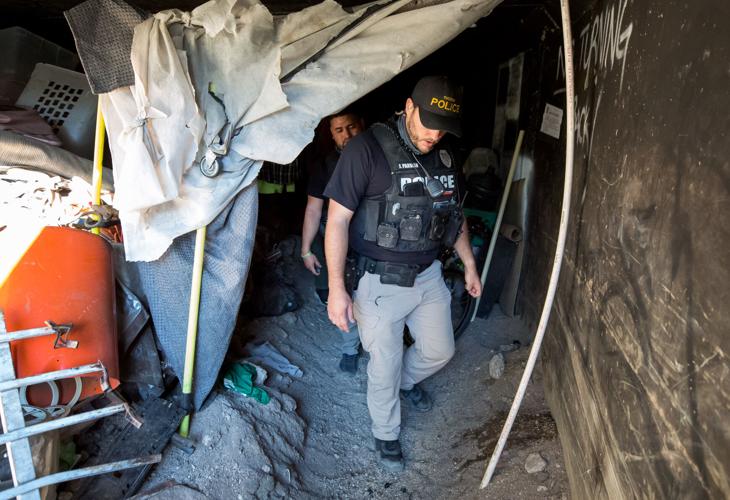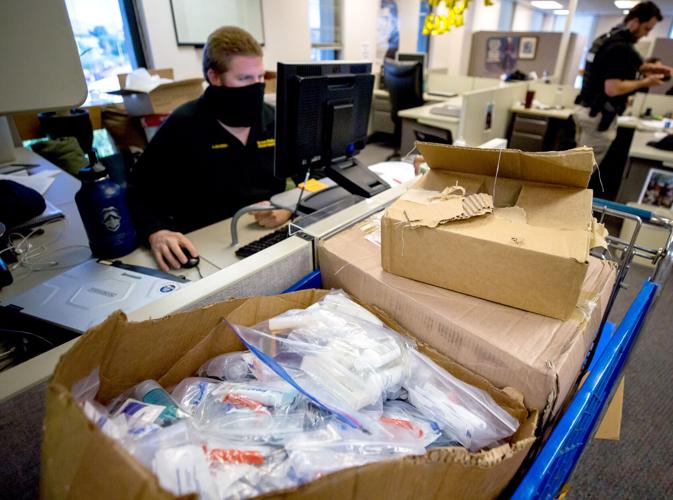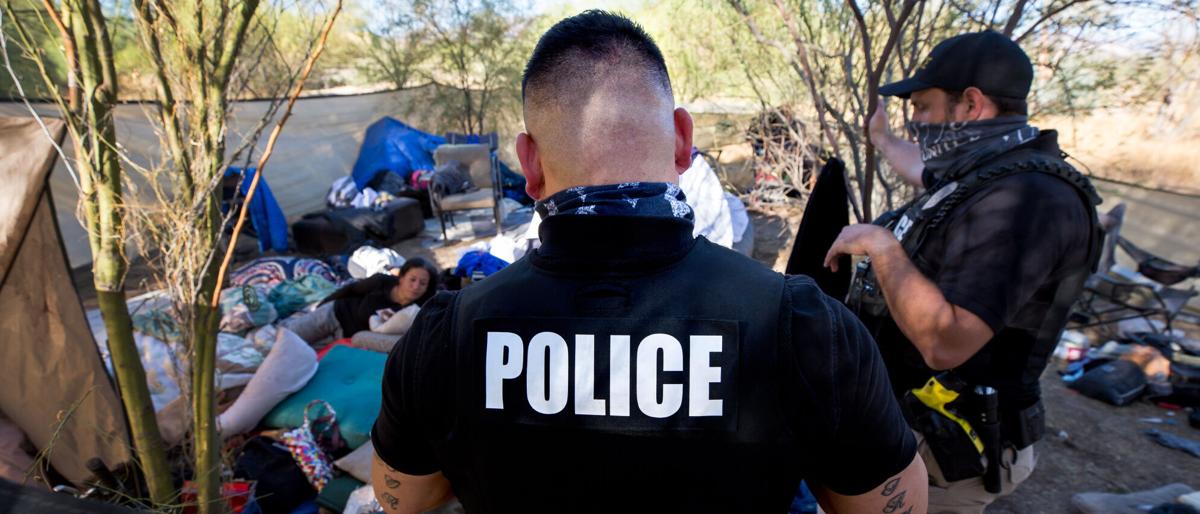On a late November afternoon, two men doze on a stack of blankets and pillows near their midtown Tucson campsite, their arms covering their faces.
A woman rests in the shade of tan tarps that surround three tents, camp chairs, suitcases, pans, crates and coolers scattered around the midtown homeless camp, south of the Rillito River near Alverrnon Way.
The trees and tarps make the site invisible from a distance. Still, someone reported the homeless camp to TPD, likely because it was next to a school, officers said. And because it was on private property, officers had to tell the people staying there they might have to relocate.
Officers Jacob Valenzuela and Josh Parrish — along with their boss, Sgt. Jack Julsing — make up the Police Department’s Homeless Outreach Team. The team, which grew out of the department’s Mental Health Support Team a year ago, responds to nonemergency reports of homelessness and tries to connect people with resources including permanent housing.
The Tucson Police Department's homeless outreach team responds to nonemergency reports of homelessness and tries to connect people with resources, including permanent housing. As part of an Arizona Daily Star special project, here's a look at what this and other police units are doing to help keep community members out of jail.
The Tucson Police Department also created a Substance Use Resource Team, all part of its growing effort to keep people out of jail and get them the help they need. Mental health, substance use and homelessness are often intertwined, with one problem a symptom of the others, said Kevin Hall, assistant police chief with the Tucson Police Department.
The Arizona Daily Star spent time with all three teams in recent months through a reporting fellowship from Solutions Journalism Network.
Addressing homelessness is a huge task, requiring the team to work with about a dozen social service groups. Team members often visit homeless camps with social workers from those organizations so people can talk directly to someone who can help them.
Their most frequent collaborator is the city’s homeless outreach team, which includes three outreach workers and a navigator to help with housing eligibility and challenges. Both homeless outreach teams also work with other city departments, including Parks and Recreation, Code Enforcement, the Tucson Fire Department, ward offices and the City Manager’s Office.
Since the city team was created in late 2017, members have engaged with over 1,000 people and found housing for 52% of individuals and 59% of families, said Jodie Barnes, project manager for the Housing and Community Development Department.
Outreach officers connect people to resources
Julsing, who has led the homeless outreach team since February 2020, says every police department in the U.S. has been given — unreasonably — the task to fix homelessness.
It’s an unachievable goal: In Pima County, the number of people who are unsheltered or temporarily sheltered on any given night rose by 20.9%, from 1,372 in 2019 to 1,660 in 2020, according to a report from Tucson’s Housing and Community Development Department.
Giving outreach officers time to reach those they are trying to help won’t fix the problem, but it can make a dent, Julsing said. Unlike patrol officers, the Homeless Outreach Team can spend more time helping people get connected to resources and possibly housing.

Officers Josh Parrish and Jacob Valenzuela leave a tunnel near the northwest corner of East River Road and North First Avenue. The person living in the tunnel chose not to receive help.
“Patrol is not going to spend three hours to get a guy into some housing program,” Julsing said. “He’s just going to either move them down the street or arrest him for warrants.”
His officers have time to talk with people, calling co-responders from the city’s homeless outreach program, detox facilities or other housing services as needed. The team has even helped move people’s things to storage units and has helped move some homeless camps to less visible areas so officers and social workers know where to find the people staying there if they qualify for a housing voucher, Julsing said.
His officers get 10 to 20 reports of homelessness each week from ward offices, the public or other officers. He asks that any nonemergency report related to homelessness be referred to his team so they can seek a long-term solution to the person’s problem.
Because the team works with so many organizations, Julsing says he doesn’t have a verifiable number of people that the team has referred to permanent long-term housing or other services. But he estimates members have responded to about 750 reports as of January and made contact with about 1,200 people. Some are familiar faces, but probably 900 of them were one-time contacts, he said.
He created a dashboard where he has mapped about 500 sites his team has visited. The team has referred roughly 150 to 200 people to some form of permanent supportive housing or facility, including Cornerstone, a local detox facility, he said.
Once a referral is made and someone is transported, Julsing can’t track who followed through with the program or ended up back on the streets, he said. Still, he believes his team is providing more help than what police have historically done: “arrest the problem.”
‘We’re not trying to flood the court system’
About half of the people the team has made contact with could have been arrested for trespassing or for outstanding warrants, but the team has issued just six ticket arrests, Julsing said.
“We’re not trying to flood the court systems or judicial systems,” Julsing said. “It’s not worth it. And it’s not gonna help that person anyway.”

A box filled with toiletries at the desk of Tucson police Sgt. Jack Julsing, who heads the department’s Homeless Outreach Team.
Julsing doesn’t mind recent discussions to defund police — not because he thinks the department’s budget should be cut, but because the conversation is pushing people to question whether police should be tasked with solving problems like homelessness, mental illness and substance use.
“We’re not going to get defunded because we already don’t have enough officers,” he said.
Julsing has been working to educate the community about hardships people face when they’re experiencing homelessness in hopes of stopping unnecessary reports to police that don’t involve criminal activity.
“We want to change the mindset of how you guys as the public, us as cops, and the homeless themselves view homelessness,” Julsing said. “We want everybody to have a clear understanding of what we’re dealing with.”
He said he gets calls from people who complain that a person experiencing homelessness is near them or in their neighborhood, and when he asks if they’re doing something wrong the person will often say, “I’m not comfortable with them being there.”
“We need to realize that when you push people around, they lose their stability,” Julsing said. “It’s like if I evicted you, it’d turn your world into a s—tstorm.”
Arresting people who are living on the streets only makes the person’s life more difficult, and it takes police away from responding to more serious crimes, Julsing said.
“My main goal is to shift the responsibility of the homeless issue away from our patrol officers and to the social workers,” he said.
He believes officers are still important in responding to homelessness, to prevent social workers from getting into a potentially dangerous situation.
‘De-coupling’ police from homeless outreach is best
For Jennifer Felner, postdoctoral fellow of public health at San Diego State University, not taking people experiencing homelessness or behavioral health problems to jail should be the bare minimum, not the primary goal.
“If that’s a success, it’s absurd, absolutely absurd, that that is a benchmark of success,” Felner said.
Felner and Megan Welsh, associate professor of criminal justice at SDSU, co-authored a memo as part of a series of research-based memos addressing public policy in San Diego late last year.
“Recent research suggests that these law enforcement encounters have long-lasting effects on how people experiencing homelessness perceive the police,” the memo says. “Not only can this create mistrust of the police, but it can lead to a reluctance to accept services offered by the police — including emergency shelter.”
Welsh said the help that is offered should meet the actual needs of people who need it and should not be forced on people.

Tucson police Officer Jacob Valenzuela gives Amanda Clough a care package while waiting for an employee from the city of Tucson’s homeless outreach program to arrive near Davidson Elementary School.
“It produces this narrative in our broader general public that people do not want help and that they’re bad and so we should police them,” she said. “So it’s a truly unhealthy and dangerous cycle.”
Homeless outreach needs to be separated entirely from police response, Welsh said. Despite homeless outreach teams having existed within police departments for at least 10 years, Felner and Welsh have not found evidence that they work.
“Why are we choosing alternatives that aren’t really rooted in science?” Welsh asked.
Because police are already well-funded and flexible, Welsh says creating specially trained units has become the “path of least resistance.” While she agrees that mental health first aid and other forms of specialized training are good, she said cities also need to start reimagining how to better address these social issues.
“We have to really start questioning, why do we keep going back and relying on the same agencies just because they’re there?” she said. “There are other entities who are far more capable to do this work without the history of violence attached to it.”
‘We’re all just trying to live’
Julsing calls most of the crimes committed by those who are experiencing homelessness “survival crimes” — littering, urinating in public, even shoplifting wouldn’t happen if a person had a home and the proper resources to survive, he says.
Officers can tell victims of such crimes that if they don’t want to press charges the person can be taken to mental health or substance use treatment, said Kevin Hall, assistant police chief. But there is no deflection program specifically for people experiencing homelessness who commit minor crimes in Tucson.
Julsing says the general public sometimes believes people are living on the streets by choice, but that’s a misconception.
“Every one of them, if I give them a key to an apartment — ‘Here’s your apartment, have fun’ — every one would take it,” he said. “But a lot of them are not going to go to the shelter.”
There are people who don’t accept help, but that’s often because there are hurdles to using the immediate resources available, Julsing said.
A person living on the streets often carries all their possessions, so they stay in the same general area to keep an eye on their stuff. In order to go to a resource center, they would have to find somewhere to leave their things and risk someone stealing them. Or they would have to separate from their partner or their pet because some shelters separate men and women and some don’t allow dogs.

Tucson police Officers Jacob Valenzuela, left, and Josh Parrish, two of the three officers in the homeless outreach unit, talk to a group of people experiencing homelessness living near Davidson Elementary School about services they can contact for help.
Setting up appointments for intake, finding a way to get to resource centers, and following through with follow-up appointments can be too much for someone just trying to survive one day at a time.
Robert Wild, homeless outreach navigator with the city of Tucson, said the Police Department creating an outreach team has helped its officers to understand homelessness.
“We’re all humans. We’re all just trying to live,” he said. “Nobody wants to be in this situation. Even the people that you think want to be, it’s usually because they’ve been through it so many times trying and they just give up on the system and jumping through the hoops that are required.”
Co-responders screen people on-site for housing
Anette Mejia, a homeless outreach worker with the city, met with two officers at the midtown homeless camp last November.
A young woman in the group, Amanda Clough, approached Mejia and the officers, chugged most of a water bottle then sat answering questions as Mejia completed a survey on her iPad.

Annette Benitez Mejia, left, who works for the city of Tucson’s homeless outreach program, gives Nevenka Obradovich, who’s been living on the streets for almost a year, a sleeping bag and some water. “It’s not as easy as people think just to, you know, ‘Get a job! Get off the street!’” says Obradovich.
The survey helps city housing employees quickly determine a person’s level of prioritization for housing assistance. It asks questions like how long a person has experienced homelessness, whether they’ve been a victim of a crime, whether they have disabilities or whether they have mental illness. The tool is used at least partially in 39 states and is used statewide in Arizona.
After filling out the surveys, Mejia told the group she may be able to get some of them into a hotel for temporary housing. She gave another woman at the camp, Nevenka Obradovich, her business card and said she’d call the next morning.
“If Annette is able to get one or all of you guys into a hotel, we’ll let her do that,” Parrish told Obradovich. “If that falls through for you, I’ll get El Rio to come out and see if they can help you out.”
There are waiting lists for many housing programs, including Section 8 or Housing Choice Vouchers.
Mejia noticed someone in the group had checked into La Frontera, a clinic that provides mental health and affordable housing resources, a month earlier.
“I can let them know that you guys have moved up here,” Officer Parrish told them. “They can try and come out and keep checking up on you guys while you’re here.”
He asked if they know where they’ll be moving, in case anyone is looking for them.
“We kind of take it one day at a time,” Obradovich said.
The officers gave Obradovich their contact information and offered to bring a truck to help them move their stuff the next day. That way they’ll know where the group relocated if the hotel plan doesn’t work out.
Along with filling out surveys and talking with people about their options at camps like this one, Wild, the city’s homeless outreach navigator, typically distributes food, water, clothes, socks, blankets, sleeping bags and sometimes ice.
“I usually carry around what’s called a P-38, which is a military-style can opener,” he said. “Because everybody wants to donate food — but it’s usually canned goods that, unless you carry a pocket knife, you can’t get into.”
Officers also hand out hygiene backpacks that include full-size body wash, shampoo, conditioner, dental hygiene items and deodorant among other items customized by gender and ethnicity. They come from I Am You 360, a local nonprofit that provides services to people experiencing homelessness and to at-risk youth.
The nonprofit refills the empty bottles at its office on 22nd Street east of Craycroft Road, and recently got a van donated so it can take its services out into the community. Desiree Cook, who founded the organization, said she has donated about 500 bags to the department since she started working with them in June and has seen 100 people return for refills.
“Collectively we believe that our most vulnerable should not look like their circumstance,” Cook said. “It’s about being treated with dignity and feeling dignified.”
Obradovich said she and her husband have been living in the streets and tunnels of Tucson for almost a year. They moved here from Florida five years ago and are trying to improve their situation and get into housing, she said.
“It’s not as easy as people think just to, you know, ‘Get a job! Get off the street!’” she said, imitating what people might say. “Yeah, well, nobody wants to hire homeless people, first off.”
Obradovich is ready to try, and so are her friends. Most people in her group, including her, recently moved into stable housing.
Three teams of Tucson police officers, often working with local social service agencies, seek out people struggling with homelessness, addicti…









